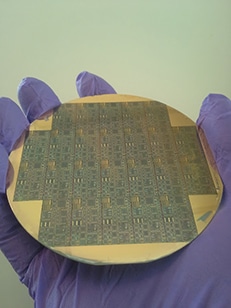
Researchers at the University of Arkansas have developed integrated circuits capable of surviving at temperatures greater than 350 degrees Celsius, or approximately 660 degrees Fahrenheit.
Created using silicon carbide, a semiconducting material that is more rugged than conventional materials used in electronics, the new circuits are expected to improve the operation of analog and digital circuits used in power electronics, automobiles and aerospace equipment. According to the researchers, silicon carbide is able to withstand extremely high voltage and is a good thermal conductor, meaning is can operate in the high temperatures often found in these industries without requiring additional equipment to remove heat.
“This ruggedness allows these circuits to be placed in locations where standard silicon-based parts can’t survive,” Alan Mantooth, Distinguished Professor, said. “The circuit blocks we designed contributed to superior performance of signal processing, controllers and driver circuitry. We are extremely excited about the results so far.”
The significance of the research is twofold. The new high temperature-resistant circuits are likely to improve electrical efficiency and reduce the size and complexity of certain systems within the national power grid by enabling better control of power electronic converters and motor drives. One-third of all power produced in the United States passes through at least one of these devices before it reaches the end-user.
In addition, in the world of power electronics and integrated circuits, the research represents the first implementation of a number of fundamental analog, digital and mixed-signal blocks, such as a phase-locked loop using a complementary-style silicon carbide technology.
The research was part of the National Science Foundation’s Building Innovation Capacity program, which partners university and industry researchers to develop ideas that can be turned into products. The University of Arkansas and two Fayetteville technology firms, Ozark Integrated Circuits and Arkansas Power Electronics International, form the basis for this innovation ecosystem. Raytheon is also a key partner. Ozark Integrated Circuits is commercializing the circuit technology, while Arkansas Power Electronics International is focusing on using the circuits in power applications.










